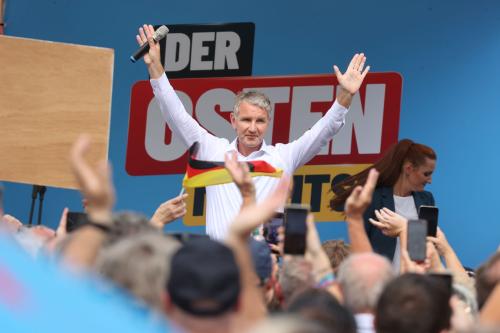In Unpacked, Brookings experts provide analysis of Trump administration policies and news. Subscribe to the Brookings Creative Lab YouTube channel to stay up to date on the latest from Unpacked.
THE ISSUE: In June 2016, voters in the United Kingdom narrowly chose to leave the European Union. The U.K. has since been negotiating with the EU over the withdrawal agreement and the shape of the future relationship. At the same time, Brexit has renewed debates within the U.K. about identity devolution arrangements – particularly in Scotland and Northern Ireland. Robert Bosch Senior Fellow Amanda Sloat explains how Brexit will alter two unions – the European Union and the United Kingdom – and the issues at play in these consequential deliberations.
Brexit is not just affecting one union but two – it is affecting the future of the European Union and it is affecting the future unity of the United Kingdom.
The things you need to know:
- In June 2016, British voters voted in a referendum on whether to leave or stay in the European Union. The results were extremely close: 51.9% of the country voted to leave while 48.1% voted to remain.
- The U.K. has since been in negotiations with the European Union on the divorce settlement as well as the political declaration on its future relationship with the EU.
- There were variations in support for leaving the EU within the U.K., most notably 62% of people in Scotland and 55.8% of people in Northern Ireland preferred to remain and now are being forced to leave as a result of the overall U.K. vote total.
- On March 29, 2019, two years after the U.K. triggered Article 50 to formally start divorce negotiations, the U.K. will formally exit the European Union. This will be followed by a 21-month transition period, in which the U.K. will be bound by all of the rules of the European Union but will not be a voting member. During that period, the final arrangements will be made for the U.K.’s future relationship with the European Union.
- Brexit is not just affecting one union but two: – the European Union and the United Kingdom.
- If you take Northern Ireland, Brexit has been extremely unsettling to politics there. In 2018 we celebrated the 20 year anniversary of the Good Friday Agreement. Unfortunately, Brexit discussions have forced people to think about identity questions and the constitution.
- Much of the debate over the withdrawal agreement has focused on the status of the Irish border, given concerns that any customs-related infrastructure would be destabilizing to the peace process there.
- Twenty years ago, power was devolved in the U.K. to Scotland, Northern Ireland, and Wales. This happened in the context of the European Union. Now that power is returning from the European Union to the United Kingdom, there are questions over who is going to control certain policy competences.
- Because people in Scotland voted overwhelmingly to stay in the European Union, many are questioning whether Brexit will force a second independence referendum there and whether Scotland could eventually become independent.
- Unlike his predecessor, President Trump is skeptical of the European Union – he has called Brexit a good thing The United States has not been actively involved in Brexit negotiations, including efforts to resolve the standoff over Northern Ireland.
- The United States wants the U.K. and the European Union to reach some sort of deal, as it recognizes that it would be very damaging to the international economy if the U.K. were to crash out of the European Union with no deal.
The sources:
Divided kingdom: How Brexit is remaking the UK’s constitutional order



Commentary
How Brexit will remake the United Kingdom
October 15, 2018